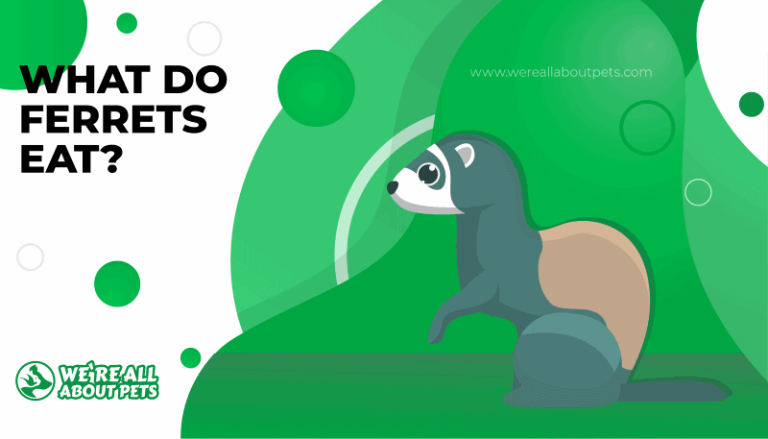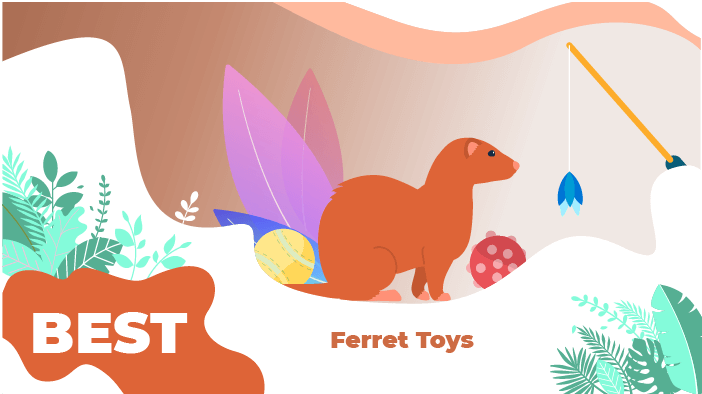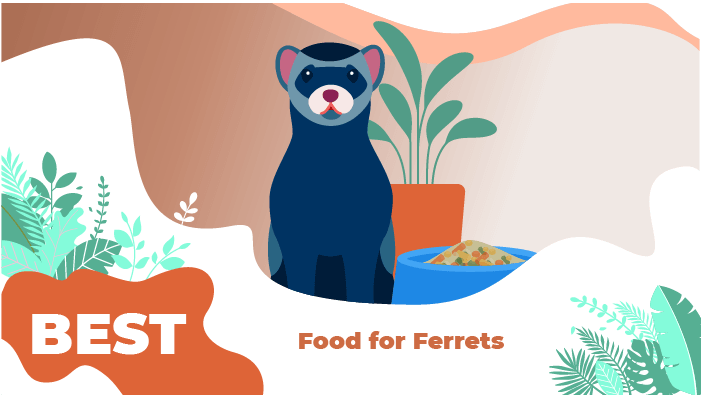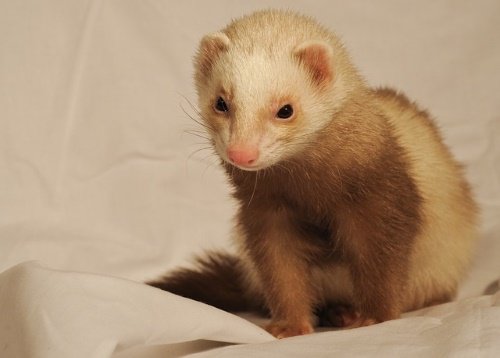What Do Ferrets Eat?
This page contains affiliate links. We may earn money or products from the companies mentioned in this post through our independently chosen links, which earn us a commission. Learn More

Ferrets are known for their goofy personalities and for being quite affectionate. They bond closely with their owners and can be very playful as well. If you’re looking for an entertaining pet who will love you as much as you love it, consider the ferret.
As a ferret owner, you are responsible for caring for your ferret properly. A big part of caring for your ferret is providing for its nutritional needs.
Ferrets are obligate carnivores, which means that they have a biological requirement for meat products in their diet.
Ferret nutrition is much different from that of many other small pets for this reason, so you need to be extra careful of what you feed your furry friend.
Feeding your pet ferret a good quality diet will ensure that you get to enjoy its company for as long as possible. With proper nutrition, your ferret could live up to 12 years. Read on to learn the basics about your ferret’s nutritional needs and to learn what to feed it.
Quick Navigation
Safe and Unsafe Fruit, Vegetables and Human Foods for Ferrets
Not only are they furry and friendly, but ferrets are also extremely playful and curious by nature.
The thing to remember, however, is that while ferrets may love just about any game you want to play with them, they won’t love any old food. Ferret nutrition is very specific, so read up before you bring your pet ferret home for good!
Are you wondering what your ferret can and can’t eat? We’ve assembled a list of dozens of foods that are and aren’t safe for your pet ferret. Check them out below!
8 Foods That Are Safe for Ferrets:
- Commercial ferret food
- Chicken
- Turkey
- Lamb
- Beef
- Game meats
- Rabbit
- Organ meats
7 Foods Ferrets Can Eat in Moderation:
Though commercial pet food for ferrets is the best option, you can also offer your ferret certain foods as treats and to add variety to the diet:
- Kitten food
- High-protein cat food
- Meat baby food
- Raw eggs (yolk only)
- Raw bones (small enough so that your ferret can’t swallow it whole)
- Baby mice or rats (purchase from a reputable retailer)
- Raw chicken wings or necks
8 Foods That Are Not Recommended for Ferrets:
Because ferrets are carnivorous by nature, you should never feed your ferret plant foods, even presumably healthy options like complex carbohydrates. Here are some of the foods you should avoid feeding your ferret:
- Vegetables
- Fruits
- Grains and seeds
- Dog food
- High-carb cat food
- Dairy products
- High-fiber foods
- Fish and fish products
12 Foods Toxic or Harmful for Ferrets:
In addition to avoiding carbohydrates in your ferret’s diet, there are other foods that could potentially be harmful or toxic:
- Cooked bones
- Bread or grains
- Sugary foods
- Peanut butter
- Tree nuts
- Apple seeds
- Avocados
- Cherry or apricot pits
- Coffee
- Onions and garlic
- Chocolate
- Xylitol
Understanding which foods are and are not safe for your ferret is very important. But, you also need to understand your ferret’s nutritional requirements if you want it to be healthy. Read on to learn the specifics of what to feed your ferret at different ages.
Ferret Food Chart

Types of Ferret Diets
Ferrets are members of the weasel family and are obligate carnivores. Your pet ferret’s wild ancestors fed on raw meat from small, whole prey – this includes fresh meat, organs, bones, skin, and even feathers and fur. Though a wild ferret’s natural diet consists of raw meat, that isn’t always feasible for the average pet owner.
Fortunately, most ferrets do well on a high-quality kitten or cat food. Just be very careful to avoid pet food with too much carbohydrate. Carbohydrate-rich diets in ferrets can lead to insulinoma, a form of cancer seen in ferrets that eat highly processed and high-carb diets.
Here is a quick breakdown of the different components of a pet ferret’s diet:
- Commercial Dry Food – A commercial food formulated for ferrets is best. But, if you can’t find it, a high-protein kitten food or cat food may be okay. Just be sure to supplement it with fresh meat to make sure your ferret’s high protein needs are met.
- Fresh Meat – If you feed your ferret a balanced commercial diet, fresh meat can still be offered as well. If you use raw meat, make sure it is very fresh and clean.
- Organ Meats – In the wild, organ meats are part of the ferret’s natural diet, so you can include them in your ferret’s diet as well. Turkey or chicken giblets are easy to feed.
- Treats – Ferret treats should be animal products only, not things like fresh vegetables or grains. Cat or kitten treats can be fed to ferrets, as can insects, giblets, or raw or cooked meat. Never feed your ferret dog treats.
Ferrets will sometimes hide their food to eat later. This could be problematic because meat will spoil if left out for too long. If you see pieces of raw meat stashed away, remove them immediately so that your ferret doesn’t get sick from eating spoiled meat.
Now that you know what kinds of foods will make up your ferret’s diet, you’re probably curious to know how much to feed it. Keep reading to learn about feeding recommendations for pet ferrets.
Meeting Your Pet Ferret’s Nutritional Needs
There are two important things to remember about your ferret’s nutritional needs. First, as a member of the weasel family, ferrets are obligate carnivores.
Being obligate carnivores, ferrets need foods that have very high protein content. Ferrets’ protein source should come from good-quality animal products like chicken or lamb.
Second, remember that your ferret has a very high metabolic rate, which means that it burns through calories very quickly.
With such a high metabolic rate, most ferrets will eat 8 to 10 small meals a day if they have the option. The best way to do this is to simply keep their bowl full, refreshing it once or twice a day as needed.
If you prefer to monitor your ferret’s food intake, you may find it more practical to offer 3 or 4 larger meals a day and let your ferret eat as much as it likes with each meal.
If you feed your ferret raw meat or raw eggs, however, it shouldn’t be left out more than an hour and must be as fresh as possible before feeding.
With baby ferrets, it’s important to feed a variety of foods and in large amounts. Ferrets imprint with food in the first 12 months, so feeding a variety will ensure that your ferret doesn’t get too picky later. For baby ferrets under 12 weeks and adult ferrets over 5 years, you may need to soften the food by moistening it with water to make it easier to chew.
Ferrets do best with an unlimited supply of food, so don’t worry too much about how much to feed your ferret. Instead, focus on the types of food.
To give you an idea of what you should be feeding your pet ferret in different stages of life, refer to this chart:
Daily Ferret Feeding Chart |
||||
| Age | Size | Commercial Food | Fresh Meat | Ferret Treats |
| Up to 12 weeks | Baby | 3:1 ratio ferret food with warm water | Any type, cooked to kill bacteria | None |
| 12 weeks to 1 year | Baby | Unlimited amounts, at least 4 meals per day (free feeding is generally best) | Any type, raw or cooked (including raw eggs, yolk only) | Cat treats, pieces of raw or cooked meat, poultry giblets |
| 1 year to 5 years | Adult | As recommended on package by age and weight (at least 4 meals, up to 10 meals a day) | Any type, raw or cooked (including raw eggs, yolk only) | Cat treats, pieces of raw or cooked meat, poultry giblets |
| 5 years and older | Adult | May soften commercial food with water | Any type, raw or cooked (including raw eggs, yolk only) | Cat treats, pieces of raw or cooked meat, poultry giblets |
In addition to making sure your ferret has access to food at all times, you also need to provide plenty of fresh water. Water is essential for hydration and digestion, so you may want to provide multiple water bottles in case one goes dry.
Recommended Commercial Ferret Foods
As carnivores, ferrets have a much shorter digestive tract than herbivores and even omnivores. Their digestive system is anatomically simple because protein is much easier to digest than plant fiber. To mimic the natural diet of wild ferrets, you should choose a high protein ferret food and avoid plant foods as much as possible.
This can be challenging with commercial pet foods, so be sure to read the label. Look for a ferret food that contains at least 36% protein and 20% fat with low carbohydrates (4%).
Here are some of our top picks for the best food for ferrets:
- Wysong Ferret Epigen 90 Digestive Support – Uniquely formulated to mimic a genetically appropriate diet for ferrets, this recipe contains 82% protein and contains natural ingredients to support the health of your ferret’s digestive system.
- ZuPreem Premium Ferret Diet – The top ferret food sold worldwide, this formula provides complete and balanced nutrition for all life stages from chicken and fish ingredients.
- Marshall Premium Ferret Diet – Recommended by veterinarians and breeders, this recipe is a healthy, balanced diet for ferrets made with chicken ingredients. It also contains vitamin and mineral supplements.
Also Read: Best Foods for Ferrets
Looking for more recommendations on what to feed your ferret? Check out our in-depth guide to the best commercial ferret foods.
By now, we hope that you understand the basics about feeding your pet ferret, but we understand if you still have a few questions. Here are the answers to some commonly asked questions about ferrets.
Ferret Feeding FAQs
What do ferrets eat in the wild?
In the wild, ferrets eat whole prey. They consume the flesh, organs, skin, and bones of small animals. This is why animal protein is such an important part of a ferret diet in captivity.
How much do ferrets eat?
Ferrets eat a lot, it’s that simple. They have a very high metabolic rate, so they require plenty of protein and calories to fuel their metabolism. Baby ferrets need a lot of food, so it is best to simply keep their food bowl full with many small meals throughout the day. Adult ferrets may need as many as 8 to 10 small meals a day.
What do ferrets drink?
Ferrets drink water. It is important to provide your ferret with access to fresh water at all times to support its digestive system. Provide multiple sources of water in case one goes dry or gets contaminated with food or dirty bedding.
Do ferrets eat insects?
Yes, insects are part of the natural diet for ferrets and can be included in your pet ferret’s diet as well. Your ferret may like crickets, mealworms, and grasshoppers.
Can ferrets eat cat food?
Ferrets Can Eat High-protein cat food in Moderation but should avoid high carb cat food








